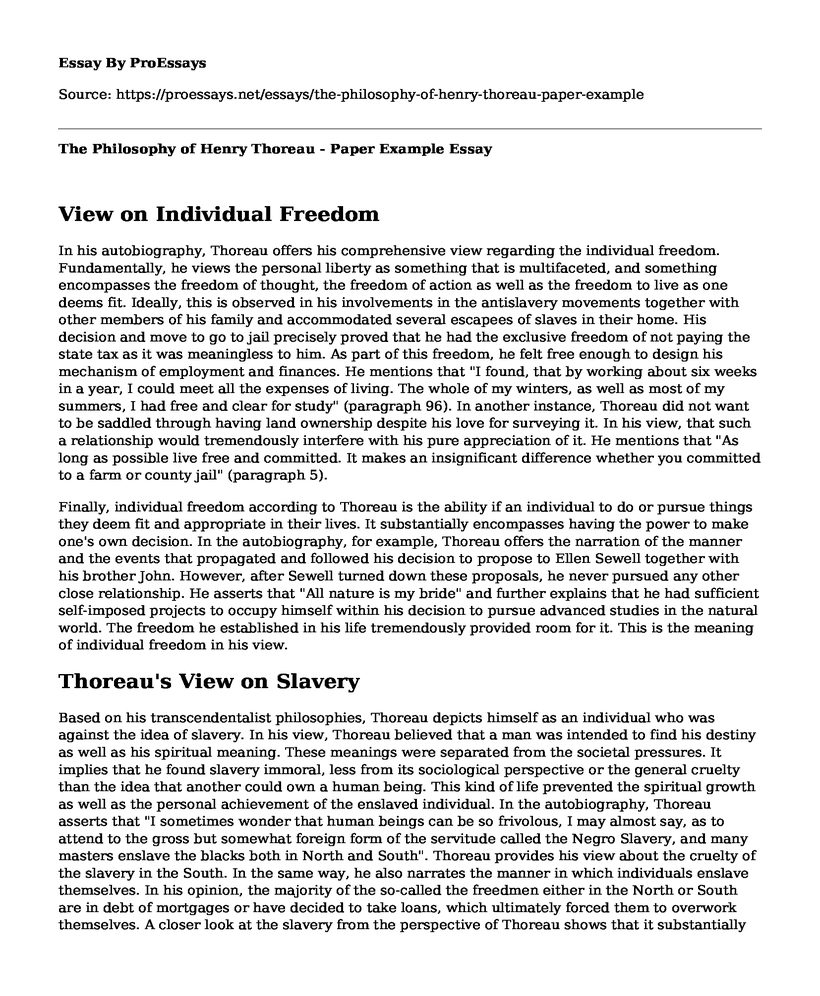View on Individual Freedom
In his autobiography, Thoreau offers his comprehensive view regarding the individual freedom. Fundamentally, he views the personal liberty as something that is multifaceted, and something encompasses the freedom of thought, the freedom of action as well as the freedom to live as one deems fit. Ideally, this is observed in his involvements in the antislavery movements together with other members of his family and accommodated several escapees of slaves in their home. His decision and move to go to jail precisely proved that he had the exclusive freedom of not paying the state tax as it was meaningless to him. As part of this freedom, he felt free enough to design his mechanism of employment and finances. He mentions that "I found, that by working about six weeks in a year, I could meet all the expenses of living. The whole of my winters, as well as most of my summers, I had free and clear for study" (paragraph 96). In another instance, Thoreau did not want to be saddled through having land ownership despite his love for surveying it. In his view, that such a relationship would tremendously interfere with his pure appreciation of it. He mentions that "As long as possible live free and committed. It makes an insignificant difference whether you committed to a farm or county jail" (paragraph 5).
Finally, individual freedom according to Thoreau is the ability if an individual to do or pursue things they deem fit and appropriate in their lives. It substantially encompasses having the power to make one's own decision. In the autobiography, for example, Thoreau offers the narration of the manner and the events that propagated and followed his decision to propose to Ellen Sewell together with his brother John. However, after Sewell turned down these proposals, he never pursued any other close relationship. He asserts that "All nature is my bride" and further explains that he had sufficient self-imposed projects to occupy himself within his decision to pursue advanced studies in the natural world. The freedom he established in his life tremendously provided room for it. This is the meaning of individual freedom in his view.
Thoreau's View on Slavery
Based on his transcendentalist philosophies, Thoreau depicts himself as an individual who was against the idea of slavery. In his view, Thoreau believed that a man was intended to find his destiny as well as his spiritual meaning. These meanings were separated from the societal pressures. It implies that he found slavery immoral, less from its sociological perspective or the general cruelty than the idea that another could own a human being. This kind of life prevented the spiritual growth as well as the personal achievement of the enslaved individual. In the autobiography, Thoreau asserts that "I sometimes wonder that human beings can be so frivolous, I may almost say, as to attend to the gross but somewhat foreign form of the servitude called the Negro Slavery, and many masters enslave the blacks both in North and South". Thoreau provides his view about the cruelty of the slavery in the South. In the same way, he also narrates the manner in which individuals enslave themselves. In his opinion, the majority of the so-called the freedmen either in the North or South are in debt of mortgages or have decided to take loans, which ultimately forced them to overwork themselves. A closer look at the slavery from the perspective of Thoreau shows that it substantially ties to the theme of simplify. If people learn to live only, they would no longer enslave themselves in the quest of possessing unnecessary things in their lives.
In the autobiography, Thoreau attacks individuals in his native state of Massachusetts and who profess to be against the slavery in the South while at the same time involving themselves in the agricultural trade and business that support it. The only practical and sincere method to express the opposition, in his view, is by establishing concrete actions as well as resistance from the enslaved people and the advocates of the anti-slavery movements.
Thoreau's View on War
Concerning war, it is undeniable to mention that a considerable component of the economy signifies Thoreau view on war. In his autobiography, he narrates the manner in which he refused to pay the poll tax as a demonstration against the injustices, imperialistic war as well as the government that intends to expand its slavery domain. The U.S invasion and occupation of Mexico was one mechanism through which the Southerners plotted to increase the slavery activities in the South. In this case, therefore, the war against the slavery and states that support it does not necessarily involve intense fight or military conquest, but a civil disobedience acts such as the refusal to pay taxes and electing politicians who are not only opposed to the slavery, but also who care for the democracy and the individual's rights.
Bibliography
Thoreau, Henry David. "Economy." Walden, ch 1 Ed. J. Lyndon Shanley. Princeton: Princeton UP (1854).
Cite this page
The Philosophy of Henry Thoreau - Paper Example. (2022, Jun 19). Retrieved from https://proessays.net/essays/the-philosophy-of-henry-thoreau-paper-example
If you are the original author of this essay and no longer wish to have it published on the ProEssays website, please click below to request its removal:
- Religion, Morals, and Slavery Essay
- Thomas Jefferson's Relationship With the Red Indians Essay
- Essay Sample on Post-war Economic Changes in America
- Rome: Virgil and Ovid - Essay Sample
- Introduction About Business Policy and Ethics - Essay Sample
- Essay Example on Reciprocal Determinism & Recycling Behavior
- Research Paper on Holocaust: The Inhumane Genocide of 6 Million European Jews 1941-1945







